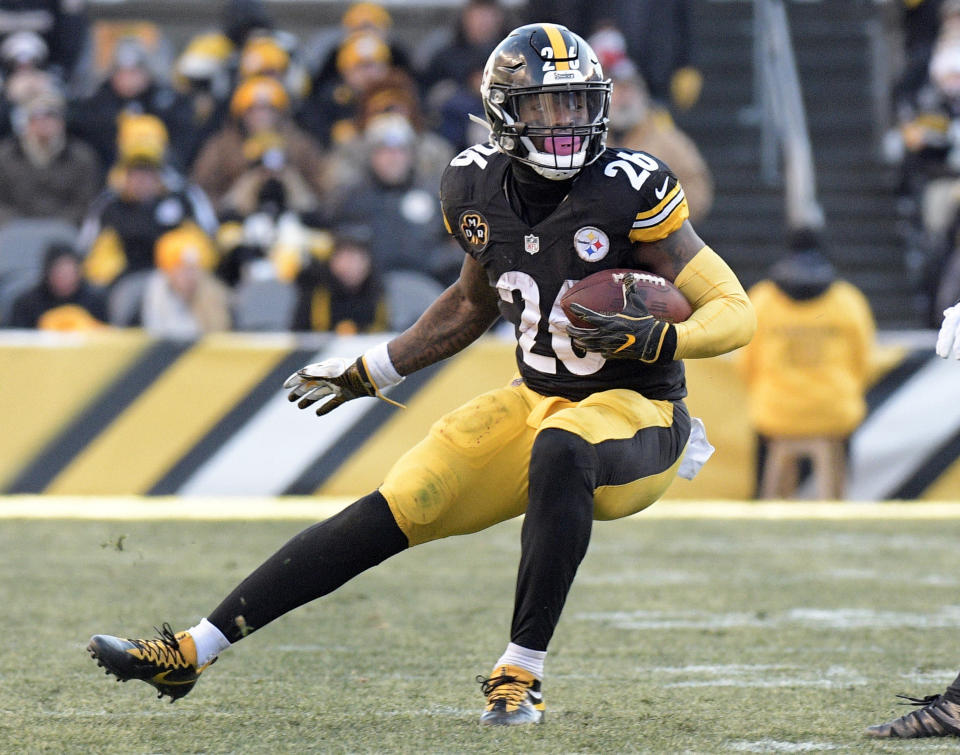Le'Veon Bell signs with the Jets and suddenly, "Running backs don't matter" makes me feel weird
Le’Veon Bell has a new home. The running back who vanished from the NFL landscape last season amid a year-long contract holdout is now officially a Steeler no more. Bell inked a four-year deal with the New York Jets that contains $35 million in guaranteed money with a max value of $61 million.
The 27 year old running back will take his place beside second-year quarterback Sam Darnold at the gravitational center of the Jets offense. He will immediately become a favorite to push for the NFL lead in touches at the running back position and reclaim a spot in the first round of redraft fantasy football leagues.
While Bell will almost certainly help the Jets improve upon a ground game that ranked 31st in rushing success rate last year, his most important work will come with what he can do in the passing game. According to Pro Football Focus, Bell ranked No. 2 in routes run among running backs in 2014 and 2016, while no other back ran more routes in 2017. Only 12 times in NFL history has a running back had 80-plus catches and cleared 10 yards per catch in a season.
Le’Veon Bell is one of the players to do it. The ceiling and floor combination his ability brings to a fantasy running back is exactly what you’re looking for.
As long as Sam Darnold continues to take the next steps in his development, we can reasonably expect this Jets unit to be a solid offense. Darnold left us with a good taste in 2018, posting a 64 percent completion rate, 8.1 adjusted yards per attempt and a 6:1 touchdown to interception ratio in December. We want running backs tethered to good offenses, so as to increase scoring chances and the odds for extended drives. Darnold is the key for that becoming a reality in New York.
Of course, it would be wildly optimistic to suggest this Adam Gase Jets offense will approach anything close to the level of the high-octane attacks that Bell once operated in during his Steelers peak. As such, Bell doesn’t have the other-worldly ceiling in New York we got used to from 2014 to 2017. That doesn’t mean he isn’t fully back in our good graces as a first-round fantasy selection, and a probably top-seven one, at that.

Still, as we officially transition into the new league year, I am still struggling with the reaction to Le’Veon Bell’s signing with the Jets. No, not measuring his fantasy value or his use in the offense. Evaluating Bell’s statistical stock is easy.
Squaring my strongly-held belief that the running back position should be devalued with my just as strong pro-player stance; that’s proving to be much more difficult.
As the details of Bell’s contract came out around midnight eastern time, I watched as many of the folks I follow quickly rushed to grab whatever notes they could to support their agenda. It wasn’t surprising. We’d been waiting for this moment for months and everyone had an opinion on what should or would happen with Bell in the negotiations. Still, I can’t remember any other time since I’ve been a fan of football where everyone seemed so invested in what a contract really means.
While everyone reacted, I had to pause and ask myself, “What am I hoping happens here?” In a rare moment for yours truly, I didn’t have a take right on hand.
I think the statistical evidence for the devaluation of the running back position is overwhelming. Dismissing the case off hand is simply disingenuous. NumberFire analyst JJ Zachariason wrote one of the best pieces out there going layer by layer to show why running backs don’t add as much as passing game players on a per play basis. 538 writer Josh Hermsmeyer laid out why rushing success is largely based on defenders in the box, down/distance and scheming. We could go on and on here.
[Best bracket wins $1M: Enter our Best Bracket Millionaire contest for free now!]
The phrase “Running backs don’t matter” didn’t just pop out of some arrogant fantasy writer’s subconscious. There’s so much data to make the case.
Even if data doesn’t drive you to lean toward the stance — and we know anecdotes tend to impact human beings more than facts — the 2018 season offered us a smattering of incidents to back the theory.
Saquon Barkley was drafted No. 2 overall and instantly became one of, if not the very best, running back in football. It didn’t matter; the Giants were still an awful offense.
The Kansas City Chiefs cut one-time NFL leading rusher Kareem Hunt in the second act of the regular season. It didn’t matter; Damien Williams stepped in an instantly replaced Hunt’s production, averaging 114 total yards per game and scoring eight touchdowns from Week 15 through their eventual playoff loss.
Todd Gurley was said to be the engine of the Rams offense. It didn’t matter when he went down with an injury, as C.J. Anderson, on his third team in 2018, quickly gave them starting-caliber play.
We can even mention Bell, who hardly was missed in Pittsburgh as the team averaged 4.5 yards per carry and scored 12 touchdowns after offering 4.1 and nine scores in 2017.

The case for the “Running backs don’t matter” theory and the devaluation of the position is strong in today’s pass-friendly NFL. Finding objective evidence that challenges our long-held beliefs and clichés about the game of football is a big part of what gets me so excited to get up every day to do this job. The hearing of this case leads me to believe that in most instances, sinking major resources into running back investments is not a smart team-building move. It’s the natural belief to be born out of the evidence we have.
However, where does that leave me from a practical standpoint? Wondering what was to be the outcome of Le’Veon Bell’s free agency tour had me staring down that question in real time. Was I really supposed to sit here and hope that Bell didn’t get the payday he wanted and be ready to laugh if an organization handed him life-changing money because doing so would go against a theory I believe in? To be honest, I don’t like that.
The whole ordeal late Tuesday night made me feel oddly conflicted and nearly downright uncomfortable. This game is violent and every single player that dons the helmet sacrifices their health in some way to partake in it. To deny that reality would be to willfully drape yourself in ignorance.
As such, I’ve long rooted for every player to do everything they can to squeeze every drop of financial juice out of their careers. The game takes so much from them, all in the name of our frivolous entertainment, that we as fans should actively desire for them to grab all that they can possibly take with them before their time runs out.
[Batter up: Join or create a 2019 Yahoo Fantasy Baseball league for free today]
Le’Veon Bell deserves as much money as he can get. I want him to get that money. I want all these players to get that money.
At the same time, I so strongly desire for this league to get smarter. I don’t want it populated by dinosaurs like Dave Gettleman, who actively send a franchise back into the stone age by shipping off a passing game difference-maker and building around a running back he shouldn’t have drafted. We need more organizations realizing the efficient tactics in roster construction and hammering them. I actively root for every team to make smarter decisions.
I’m personally invested in seeing this game be the best version of itself. Not just because it’s my job now and hopefully for decades to come to cover the NFL but because I truly receive joy from this weird game I’m so in love with and having a place in its universe. In order for that to happen to a great degree every year, the teams need to make smarter decisions at a higher rate than they do right now.
So, how do you square the belief that investing significant resources in the running back position is not the best team-building strategy with my sincere desire for every player to reap the financial rewards of their play? My two rooting interests seem in conflict here. I want the league to be smarter. I don’t think investing in running backs is smart but I want every player to get their money. After years and months of never thinking about it, this conflict has begun to really bother me.
I don’t think the emotional response I’m feeling from this debate is going to alter my views on team-building strategy. I’ve never been a “Running backs don’t matter” extremist; my industry friend Davis Mattek would tell me I’m too much of a football centrist for that. Intuitively, there’s a point where one running back being better at the game than another moves the needle. From a mental standpoint, I think running over an opposing defense is demoralizing and that effect does matter.
Yet, I’ve still held strong in believing that running backs are replaceable and investing in them isn’t a plus-expected-value move. I’ve just never felt conflicted about it before.
One thing is for certain: First and foremost, players are what make this game go. Not organizations. Not decision-makers. Not front offices. Not ownership. As enthralling as a master-class on efficiency with Bill Belichick would be, I’m damn sure not watching that over a 60-minute football game featuring the battle between these pristine athletes. Without the players, we have nothing … or at least we have something worse than the NFL product.
Glory to the game, glory to the players. Those athletes are people out there and I never want to lost sight of that.
Nevertheless, the conflict remains and I’m not sure what to do about it. All I know is some of the beliefs I have come to adopt about how NFL teams should handle the running back position have started to make me feel weird.
Maybe I just have to accept the cold, cruel reality of the world as it is. The beliefs we have about the devaluation of the running back position are correct — they just also happen to suck. Perhaps that’s the uninspiring answer.
I’m not telling you how to feel about it, but that’s how I feel about it. Thanks for hearing me out.


